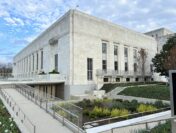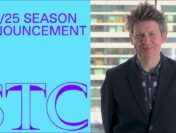The Hugh M. Hefner Foundation held its Hugh M. Hefner First Amendment Awards in Washington, DC Tuesday night. The event, normally held at the Playboy Mansion (though it came to DC once in 2008), was ready for some primetime on the political playground… especially as this year, Edward Snowdon was involved.
Christie Hefner, daughter of the infamous Hugh, established the awards in 1979 in conjunction with Playboy magazine’s 25th anniversary — “to honor individuals who have made significant contributions in the vital effort to protect and enhance First Amendment rights for all Americans.”
Among the winners was Glen Greenwald, recognized in the Journalism field, and described as a political journalist, lawyer, author, blogger and columnist. Whether you agreed with it or not (First Amendment!), Greenwald’s award was for publishing the first in a series of reports detailing NSA surveillance programs, based on classified documents leaked by Edward Snowden.
Though he was the only honoree not to appear in person at the event, he did speak via recorded message to the audience, saying, basically, that he first thought of his ultra-conservative Father when he found out that he won:
“I realized instantly that receiving an award named after Hugh Hefner would be the first time that he really felt unqualified enthusiasm about the work that I was doing… and would be truly impressed in a way that was free of caveats. So thank you for that,” he said.
.
This year’s winners in other categories included:
- Norman Dorsen (Lifetime Achievement Award): for more than a half-century, he has been at the forefront of the fight to advance fundamental freedoms and protect civil rights and civil liberties.
- Muneer Awad (Government): former executive director of the Council on American-Islamic Relations Oklahoma Chapter.
- Mary Beth Tinker and Mike Hiestand (Education): for organizing the Tinker Tour, a national free speech and free press tour to promote the First Amendment through the stories of young people.
- Thomas Healy (Book Publishing): author of, The Great Dissent: How Oliver Wendell Holmes Changed His Mind—and Changed the History of Free Speech in America (Metropolitan Books, 2013) and professor of law at Seton Hall.
- Christopher Finan (Law): president of the American Booksellers Foundation for Free Expression, for presenting key issues on the impact of the 9/11 attacks on First Amendment rights to middle and high school students in his book, National Security and Free Speech: The Debate Since 9/11 (IDEBATE Press, 2013).





